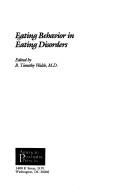| Listing 1 - 5 of 5 |
Sort by
|
Book
ISBN: 9781585625093 1585625094 9781615370399 1615370390 Year: 2016 Publisher: Arlington, Virginia : American Psychiatric Association Publishing,
Abstract | Keywords | Export | Availability | Bookmark
 Loading...
Loading...Choose an application
- Reference Manager
- EndNote
- RefWorks (Direct export to RefWorks)
Chapters on assessment and treatment, along with accompanying videos, offer comprehensive, state-of-the-art coverage that will benefit clinicians in practice, such as psychiatrists and psychotherapists, as well as mental health trainees.
Eating disorders --- Diagnosis. --- Treatment.

ISBN: 0880481633 Year: 1988 Publisher: Washington (D.C.) : American psychiatric press,
Abstract | Keywords | Export | Availability | Bookmark
 Loading...
Loading...Choose an application
- Reference Manager
- EndNote
- RefWorks (Direct export to RefWorks)
Compulsive eating --- Eating disorders --- Food habits --- Anorexia Nervosa --- Appetite Disorders --- Bulimia --- Feeding Behavior --- Congresses. --- Psychological aspects
Book
ISBN: 1462536093 9781462536092 Year: 2018 Publisher: New York The Guilford Press
Abstract | Keywords | Export | Availability | Bookmark
 Loading...
Loading...Choose an application
- Reference Manager
- EndNote
- RefWorks (Direct export to RefWorks)
Acclaimed for its encyclopedic coverage, this is the only handbook that synthesizes current knowledge and clinical practices in the fields of both eating disorders and obesity. Like the prior editions, the significantly revised third edition features more than 100 concise, focused chapters with lists of key readings in place of extended references. All aspects of eating disorders and obesity are addressed by foremost clinical researchers: classification, causes, consequences, risk factors, and pathophysiology, as well as prevention, treatment, assessment, and diagnosis. Acclaimed for its encyclopedic coverage, this is the only handbook that synthesizes current knowledge and clinical practices in the fields of both eating disorders and obesity. Like the prior editions, the significantly revised third edition features more than 100 concise, focused chapters with lists of key readings in place of extended references. All aspects of eating disorders and obesity are addressed by foremost clinical researchers: classification, causes, consequences, risk factors, and pathophysiology, as well as prevention, treatment, assessment, and diagnosis. This revised edition reflects 15 years of important advances in both fields, including state-of-the-art intervention approaches and a growing focus on how the brain regulates eating behavior and contains dozens of new chapters. In addition to expanded coverage of prevention and policy, new topics covered include epigenetics, body weight and neurocognitive function, stress and emotion regulation, the gut microbiome, surgical devices for obesity, food labeling and marketing, and more.
Book
ISBN: 1462529070 1462529100 Year: 2017 Publisher: New York, New York ; London, [England] : The Guilford Press,
Abstract | Keywords | Export | Availability | Bookmark
 Loading...
Loading...Choose an application
- Reference Manager
- EndNote
- RefWorks (Direct export to RefWorks)
Acclaimed for its encyclopedic coverage, this is the only handbook that synthesizes current knowledge and clinical practices in the fields of both eating disorders and obesity. Like the prior editions, the significantly revised third edition features more than 100 concise, focused chapters with lists of key readings in place of extended references. All aspects of eating disorders and obesity are addressed by foremost clinical researchers: classification, causes, consequences, risk factors, and pathophysiology, as well as prevention, treatment, assessment, and diagnosis. New to This Edition *Reflects 15 years of important advances in both fields, including state-of-the-art intervention approaches and a growing focus on how the brain regulates eating behavior. *Dozens of entirely new chapters. *New topics: epigenetics, body weight and neurocognitive function, stress and emotion regulation, the gut microbiome, surgical devices for obesity, food labeling and marketing, and more. *Expanded coverage of prevention and policy.
Book
ISBN: 0190926627 0197569757 0190926619 Year: 2020 Publisher: New York : Oxford University Press,
Abstract | Keywords | Export | Availability | Bookmark
 Loading...
Loading...Choose an application
- Reference Manager
- EndNote
- RefWorks (Direct export to RefWorks)
Eating disorders are serious psychiatric illnesses that are frequently misunderstood. They typically begin during adolescence or early adulthood, a time when young people are heading to college or interviewing for a first job. Many people recover fully from eating disorders, but others become chronically ill, and symptoms persist into middle age and beyond. This book answers common questions about eating disorders, including anorexia nervosa, bulimia nervosa, and binge eating disorder, as well as a newly described condition, avoidant/restrictive food intake disorder (ARFID).
Eating disorders. --- Eating disorders --- Eating disorders --- Treatment. --- Prevention.
| Listing 1 - 5 of 5 |
Sort by
|

 Search
Search Feedback
Feedback About UniCat
About UniCat  Help
Help News
News